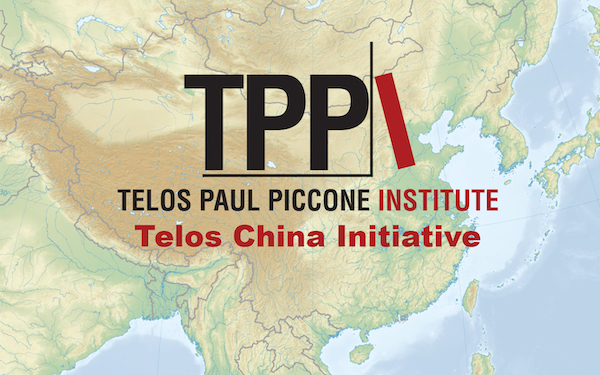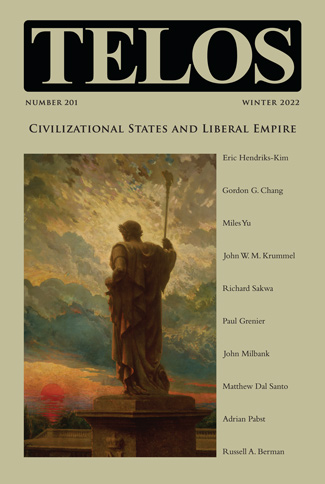The video of the third webinar in the Telos-Paul Piccone Institute’s “China Keywords” series is now available and can be viewed here. In this webinar, Eric Hendriks talks with Prof. Shadi Bartsch about the reception and use of ancient Greek philosophers in contemporary Chinese political thought.
Prof. Bartsch is the Helen A. Regenstein Distinguished Service Professor of Classics at the University of Chicago and the author and editor of a dozen books on Greek and Roman Antiquity. For her latest monograph on the reception of the ancient Greeks in China, she spent ten years studying Mandarin. The effort paid off: its fruit is Plato Goes to China: The Greek Classics and Chinese Nationalism (Princeton University Press, 2023).
Continue reading →
 The third webinar of the Telos-Paul Piccone Institute’s “China Keywords” series, entitled “The Greeks according to Chinese Nationalist Intellectuals,” will take place on Thursday, May 16, from 10:00 to 11:00 a.m. Eastern Time (16:00 to 17:00 Central European Time). Our guest will be Prof. Shadi Bartsch, who will discuss the reception and use of ancient Greek philosophers in contemporary Chinese political thought. Plato and Aristotle figure prominently in anti-Western polemics. The third webinar of the Telos-Paul Piccone Institute’s “China Keywords” series, entitled “The Greeks according to Chinese Nationalist Intellectuals,” will take place on Thursday, May 16, from 10:00 to 11:00 a.m. Eastern Time (16:00 to 17:00 Central European Time). Our guest will be Prof. Shadi Bartsch, who will discuss the reception and use of ancient Greek philosophers in contemporary Chinese political thought. Plato and Aristotle figure prominently in anti-Western polemics.
Click here to register for the webinar.
Continue reading →
By Telos Press · Wednesday, May 3, 2023 In today’s episode of the Telos Press Podcast, David Pan talks with Matthew Dal Santo about his article “Russia, the Ukraine War, and the West’s Empire of Secularization,” from Telos 201 (Winter 2022). An excerpt of the article appears here. In their conversation they discuss Augusto Del Noce’s view of twentieth-century secularization as the unfolding of the philosophy of atheism; how Del Noce understood secularization; why, if Marxism is atheistic, Del Noce sees the West as more atheistic than the Soviet Union; why the alliance between the United States and Ukraine is a secularist one; why it is necessary to link religion and politics to avoid secularization; how the idea of the Holy Rus’ presents a politics that realizes a religious project rather than one that replaces a religious project with a nationalist political one, and how we might differentiate between the two possibilities; the distinction between the causality of (or immediate reasons for) the war in Ukraine and its meaning (or higher causality); and how to make sense of a contradiction between the two in the case of the Russian invasion of Ukraine. If your university has an online subscription to Telos, you can read the full article at the Telos Online website. For non-subscribers, learn how your university can begin a subscription to Telos at our library recommendation page. Print copies of Telos 201 are available for purchase in our online store.
Continue reading →
By David Pan · Friday, February 24, 2023  On the anniversary of the Russian invasion of Ukraine, the continuing war indicates that the foundations of a rules-based global order are not just the rules themselves but also the structure of sovereignty that supports those rules. Sovereignty includes both the use of power and the establishment of a legitimating vision of order. The challenges to the Westphalian system of global order consequently come not just from the Russian invasion but also from the Russian idea of its civilizational mission against Western secularism as well as China’s idea of a “shared humanity for mankind.” Telos 201 provides analyses of both of these alternative visions for global order. Matthew Dal Santo, for example, describes Russia’s stance as a defense of a spiritual rather than a secular conception of the basis of order. Gordon Chang analyzes the way in which China has been promoting its tianxia model of unified global governance against the chaos and conflict of separate sovereign nation-states. The frame within which to view these alternative visions is not the struggle between spirituality and secularism or between China and the West, but the global development of nationalism. On the anniversary of the Russian invasion of Ukraine, the continuing war indicates that the foundations of a rules-based global order are not just the rules themselves but also the structure of sovereignty that supports those rules. Sovereignty includes both the use of power and the establishment of a legitimating vision of order. The challenges to the Westphalian system of global order consequently come not just from the Russian invasion but also from the Russian idea of its civilizational mission against Western secularism as well as China’s idea of a “shared humanity for mankind.” Telos 201 provides analyses of both of these alternative visions for global order. Matthew Dal Santo, for example, describes Russia’s stance as a defense of a spiritual rather than a secular conception of the basis of order. Gordon Chang analyzes the way in which China has been promoting its tianxia model of unified global governance against the chaos and conflict of separate sovereign nation-states. The frame within which to view these alternative visions is not the struggle between spirituality and secularism or between China and the West, but the global development of nationalism.
Continue reading →
By Telos Press · Monday, July 25, 2022 In today’s episode of the Telos Press Podcast, David Pan talks with Mark G.E. Kelly and Timothy W. Luke about the Russian invasion of Ukraine and its consequences for world order. Our current issue, Telos 199 (Summer 2022), features essays by Luke, Kelly, and Pan on the war in Ukraine, excerpts of which appear here. Click through to read the full articles at the Telos Online website (subscription required). To learn how your university can subscribe to Telos, visit our library recommendation page. Print copies of Telos 199 are also available for purchase in our online store.
Continue reading →
By Russell A. Berman · Monday, March 28, 2022 One of the surprising aspects of the Ukraine War is that it came as a surprise. After the devastation that Russia wreaked in Chechnya, after the invasion of Georgia, after the occupation of Crimea—and the list goes on: after Russia’s complicity in the destruction of Aleppo and the violence of the Wagner Group deployments especially in Africa, and, most obviously, after Putin’s explicit declaration of his intent, the West could nevertheless watch Russia prepare for the invasion and still believe that it would not happen. Before the invasion would have been the time to arm Ukraine. Instead the West succumbed to a Chamberlain-like logic of self-delusion: if we do nothing, the aggressor will dissipate. The wishful thinking of liberalism is a scourge. It remains to be seen whether the brutality of Russian violence will change that mindset in the foreign policy elite. Optimism is not warranted.
Continue reading →
|
|




